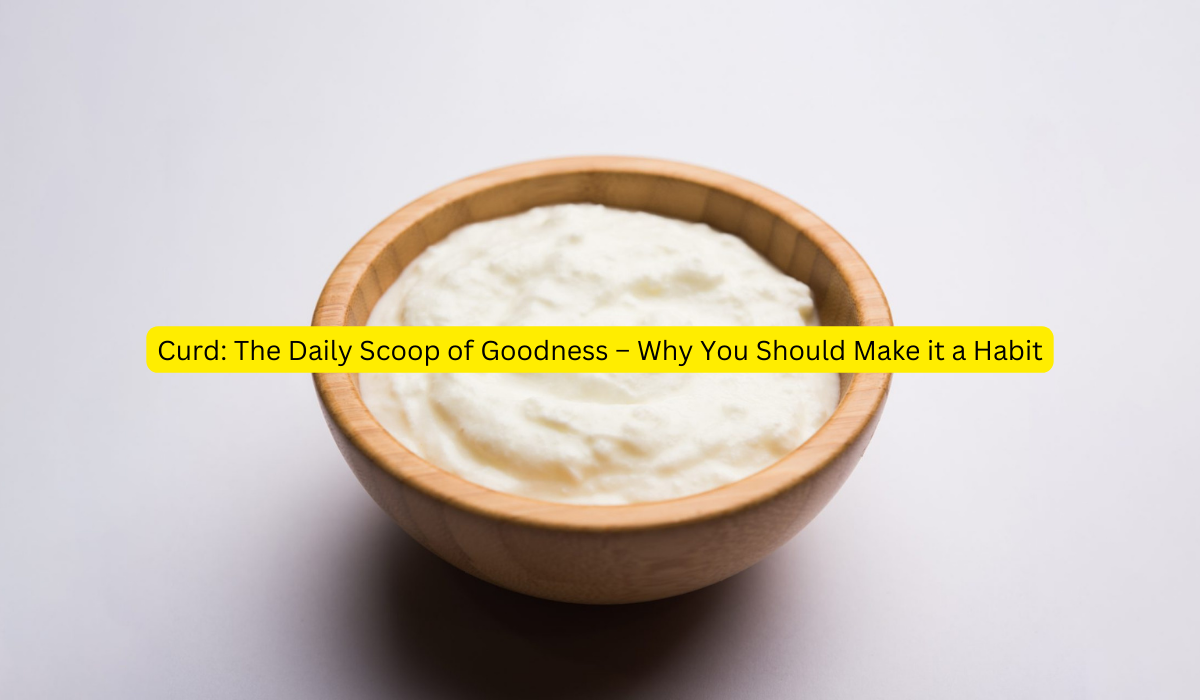We all know curd, also known as yogurt, is a delicious and refreshing dairy product. But is there more to this creamy delight than just its taste? Absolutely! Curd boasts a surprising array of health benefits, making it a strong contender for a daily spot in your diet. Imagine a tiny pot of curd as a treasure chest overflowing with health-promoting goodies – that’s what you’re incorporating into your routine!
A Powerhouse of Probiotics: Boosting Your Gut Health
Curd is a natural source of probiotics, the good bacteria that reside in your gut. Think of your gut as a bustling ecosystem – these friendly bacteria help maintain a healthy balance, aiding digestion, nutrient absorption, and even boosting your immune system. Regular curd consumption acts like a daily dose of reinforcements for your gut’s good guys!
Here’s how curd’s probiotic power can benefit you:
- Improved Digestion: Probiotics help break down food and regulate bowel movements, potentially alleviating bloating, constipation, and diarrhea.
- Stronger Immunity: A healthy gut microbiome is linked to a robust immune system, better equipped to fight off infections and illnesses.
- Reduced Risk of Inflammatory Bowel Disease: Studies suggest regular probiotic intake might help prevent or manage inflammatory bowel diseases like ulcerative colitis.
Important Note: While curd offers a good dose of probiotics, it’s not a magic bullet. Maintain a balanced diet and consult a healthcare professional for any specific gut health concerns.
A Champion for Bone Health: Rich in Calcium and Vitamin D
Curd is a champion for bone health, packing a punch of calcium and sometimes, Vitamin D (depending on the preparation). These nutrients are crucial for building strong bones and preventing conditions like osteoporosis, especially as we age.
Here’s how curd’s calcium and Vitamin D content can benefit you:
- Stronger Bones and Teeth: Calcium serves as the building block for bones and teeth. Vitamin D helps your body absorb calcium effectively. Curd provides both in a delicious and convenient package.
- Reduced Risk of Osteoporosis: Regular calcium and Vitamin D intake can significantly reduce the risk of developing osteoporosis, a condition characterized by weakened bones.
Remember: Calcium and Vitamin D work synergistically for optimal bone health. Explore options like fortified curd or include other dietary sources of Vitamin D alongside curd for maximum benefit.
Aiding Weight Management: Curd’s Protein Power
Curd is a good source of protein, a macronutrient known for its satiating properties. Protein helps you feel fuller for longer, potentially reducing cravings and aiding weight management efforts.
Here’s how curd’s protein content can benefit you:
- Reduced Calorie Intake: Feeling full after meals can keep you from reaching for unhealthy snacks, potentially reducing overall calorie intake.
- Increased Muscle Mass: Protein is essential for building and maintaining muscle mass. This can boost your metabolism and aid in weight management.
A Word of Caution: While curd can be a helpful tool for weight management, it’s not a standalone solution. Focus on a balanced diet and regular exercise alongside your daily curd intake.
Beyond the Basics: Curd’s Versatility in Your Diet
Curd is a wonderfully versatile ingredient that can be enjoyed in its plain form or incorporated into various dishes. Here are some ideas to get you started:
- Breakfast Delight: Whip up a refreshing smoothie with curd, fruits, and honey for a nutritious and satisfying breakfast.
- Savory Sidekick: Dollop some curd on your dal or curry for a creamy and tangy flavor boost.
- Cooling Raita: Create a refreshing raita by mixing curd with chopped vegetables and spices to accompany your meals.
- Tangy Dip: Whip up a simple yogurt dip with herbs and spices – perfect for crudités or pita bread.
Remember, curd can be enjoyed in many ways – explore recipes and find what suits your taste buds!
Conclusion: A Daily Dose of Goodness Awaits
Curd, with its wealth of probiotics, calcium, protein, and versatility, deserves a daily spot in your diet. From promoting gut health and strong bones to aiding weight management, curd offers a range of benefits for overall well-being. So, the next time you’re at the grocery store, don’t forget to grab a tub of curd – your body will thank you for it!
Frequently Asked Questions
1. Is curd suitable for lactose intolerant individuals?
While traditional curd contains lactose, some commercially available options are lactose-free. Look for curd labeled “lactose-free” if you have lactose intolerance. Additionally, some yogurt varieties are made with non-dairy alternatives like soy milk or almond milk, offering a delicious option for those who avoid dairy altogether.
2. How much curd should I consume daily?
A moderate serving (around 150-200 grams) of curd daily is generally considered safe and beneficial. However, the optimal amount might vary depending on your individual needs and overall diet. Consulting a registered dietitian can help you determine the best amount of curd to incorporate into your daily routine.
3. Can curd consumption interfere with any medications?
While generally safe, curd might interact with certain medications, particularly antibiotics. If you’re taking any medications, consult your doctor before significantly increasing your curd intake.
4. Is homemade curd always better than store-bought curd?
Both homemade and store-bought curd can offer health benefits. Homemade curd allows you to control the ingredients and fermentation process. However, store-bought options ensure consistent quality and convenience. Choose the option that best fits your lifestyle and preferences.
5. What are some alternative sources of probiotics if I don’t enjoy the taste of curd?
If you’re not a fan of curd’s taste or texture, you can explore other dietary sources of probiotics. Kefir, a fermented milk drink, offers a similar probiotic punch. Additionally, fermented foods like kimchi, kombucha, and sauerkraut are excellent sources of gut-friendly bacteria.

